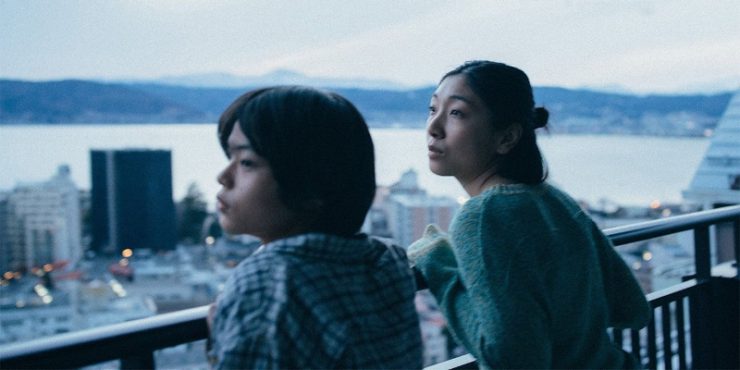Narrative simplicity and character complexity are often the hallmarks of filmmaker Hirokazu Kore-eda. While he has a gift for drama, it almost never spawns itself out of mechanical plot points. He’s often influenced by real life stories and is frequently moved toward the experience of childhood and adolescence. His most well-known films have that warm, lived-in feeling that so brilliantly makes the characters familiar in a single moment. Like all great realists, Kore-eda often tells stories that feel over-dramatic, which of course is a great sign that we’re hurtling closer toward the true nature of the world.
Monster is a story built on secrets, and the lies we tell to keep them. It involves a single mother, Saori (Sakura Ando), and her son, Minato (Soya Kurokawa), Minato’s teacher, Mr. Hori (Eita Nagayama), and Minato’s schoolmate, Yori (Hinata Hiiragi). The film’s script, by Yuji Sakamoto, unfolds in a three-act Roshomon structure, with each part from a different perspective. Like Roshomon, as each part gets relayed the nuances of the story and those involved in it become clearer, adding context and understanding to everything you’ve watched before.
Things begin when Saori notices Minato acting lethargic and aloof. When he comes home from school with an injury to his arm and his ear, she demands an explanation from the school staff. The principal (Yuko Tanaka) has just returned from a leave absence after the tragic death of her grandchild. Visibly bereft and emotionally catatonic, the principal is unable to give Saori the explanation she desperately seeks. When Mr. Hori accused of abusing his students, his apology feels half-hearted and begrudging, which only enrages Saori more. All the while, Minato continues to behave cryptically, only adding to the feeling that there is much more to the story than what meets the eye.
There is a clunkiness to the screenplay here, and Monster is a film that’s difficult to truly understand until you get to the final third, which appropriately contextualizes everything that you previously watched. Because Kore-eda is such a skilled conductor of character and performance, you always feel like you’re in good hands, even when you’re unsure of what’s actually happening. By the end, the satisfaction of the full story does repay some of the aimlessness you may have felt, and like all Kore-eda films, you get the sense that repeated viewings will only enrich the experience.
This is a film that’s difficult to talk about without revealing the details of its last act, so I’ll be brief. Monster has all the makings of Kore-eda’s best films – the pregnant pauses filled with meaning, the latent sorrow underneath the narrative buoyancy – even if its occasionally clumsy in some of its plot beats. The performances from its main cast – in particular, the two main child actors, Kurokawa and Hiiragi – are stellar and will keep you invested before the fuller picture has made itself known. This doesn’t rank among Kore-eda’s masterpieces (of which there are several), but it is still rather effective.
Side note: Monster contains the last film score by legendary Japanese composer Ryuichi Sakamoto, the genius who authored the incredible scores for Mr. Christmas Mr. Lawrence and The Last Emperor, amongst a very impressive commercial music career. The music in Monster is a composite of previously recorded songs that Sakamoto submitted to Kore-eda as his illness prevented him from composing a full score. That said, Sakamoto’s lush composition sings beautifully here, and Kore-eda does a good job incorporating his sweeping motifs into his minor key film. A wonderful and moving send-off from one all-time great to another.
Directed by Hirokazu Kore-eda










